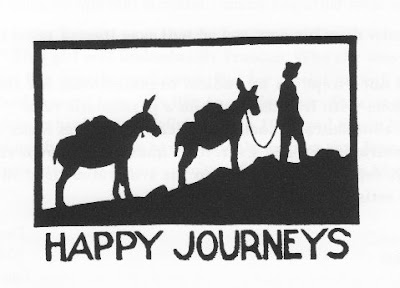Mobilis in Mobile--Freedom in a Free World
I finished reading Everett Ruess: A Vagabond for Beauty. For those who don't know, Everett Ruess was the Christopher McCandless of the Depression era. I'm guessing that definition doesn't help many people; if you know one you know the other. Ruess was a young aspiring artist that became somewhat of a legend after disappearing mysteriously in the canyons of Southern Utah outside the town of Escalante in late 1934, leaving behind his donkeys, a pair of "NEMO 1934" inscriptions, and no sign of his belongings. Krakauer mentions him in Into the Wild and Stegner mentions him in Mormon Country. Vagabond is a collection of Everett's letters home to his family and friends from the years preceding his disappearance. Unfortunately, I'm pretty sure that this book will only be enjoyed by a subset of those already infected with the wanderlust virus. Everett's letters are left to stand on their own for the most part, without much explanation or analysis. I think an unedited collection of pretty much anyone's letters would be uninteresting, and Everett is unfortunately no exception. Much of my communication with my parents is limited to "Mom, could you please look in my closet and send me the pants to my black suit?" (By the way, I looked awesome in that suit, so if anybody knows where the pants are, I'd love to know.) Most of you would not find this interesting, and I don't blame you. I don't find it interesting, and I don't find Everett's
Everett is also frequently described as "sensitive," and his letters are what some might describe as soulful. I don't want to be too big a jerk here, because Everett was a talented artist and by all accounts a very nice kid (he was only 20 when he disappeared) who probably got robbed and murdered, but that means I might describe his letters, in the literary sense, as saccharin sentimentality or new-agey bullsh--: "Now the aspen trunks are tall and white in the moonlight. A wind croons in the pines. The mountain sleeps." I don't think that's the appropriate way to critique the writing since it is just casual correspondence, but since it is just correspondence, it could do a lot better with exposition and analysis, of which editor W.L. Rusho provides little.
The version I read is an annoyingly typo-laden two-book combination edition of Vagabond (Ruess' letters) along with his journals, The Wilderness Journals of Everett Ruess. I suppose I'll eventually get around to reading the second half.

Similar to the above, the book is full of Ruess' block prints of beautiful southwest redrock. I love Ruess' art, I find his story fascinating, and I envy his devotion to living a life of adventure and freedom, but I just don't think I need to read every single note he wrote home asking his mom to send him a pair of pants.
"Both my trousers are quite worn out, so please mail the striped grey ones that fit me (not the baggy ones) to El Portal, with instructions to hold a week or two. I'd also like to have another 200-page diary book if you can find one reasonably. You might send five dollars of the October money to El Portal."very interesting either. (But seriously, if you know where the pants to my black custom-tailored suit are, TELL ME.)
Everett is also frequently described as "sensitive," and his letters are what some might describe as soulful. I don't want to be too big a jerk here, because Everett was a talented artist and by all accounts a very nice kid (he was only 20 when he disappeared) who probably got robbed and murdered, but that means I might describe his letters, in the literary sense, as saccharin sentimentality or new-agey bullsh--: "Now the aspen trunks are tall and white in the moonlight. A wind croons in the pines. The mountain sleeps." I don't think that's the appropriate way to critique the writing since it is just casual correspondence, but since it is just correspondence, it could do a lot better with exposition and analysis, of which editor W.L. Rusho provides little.
The version I read is an annoyingly typo-laden two-book combination edition of Vagabond (Ruess' letters) along with his journals, The Wilderness Journals of Everett Ruess. I suppose I'll eventually get around to reading the second half.

Similar to the above, the book is full of Ruess' block prints of beautiful southwest redrock. I love Ruess' art, I find his story fascinating, and I envy his devotion to living a life of adventure and freedom, but I just don't think I need to read every single note he wrote home asking his mom to send him a pair of pants.



Comments
Post a Comment